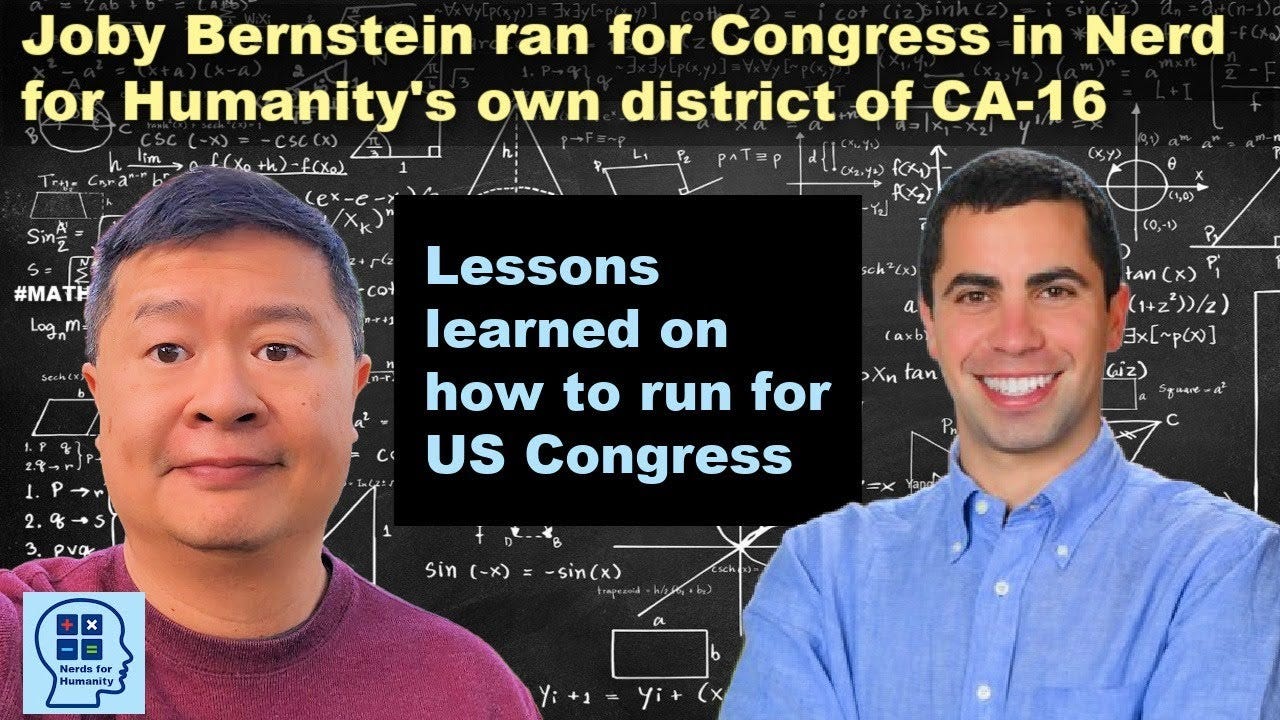Lessons from the Campaign Trail: Joby Bernstein's First Congressional Run
Former candidate and current Stanford graduate student shared insights on fundraising, hiring, and the future of AI in politics
In a recent episode of the Nerds for Humanity podcast, host Tom interviewed Joby Bernstein, a former candidate for California's 16th Congressional District. Bernstein, a student at Stanford Business School and the Doerr School of Sustainability, ran in the highly competitive primary but ultimately did not secure the nomination. In the interview, he shared his experiences from the campaign trail, discussing what worked, what didn't, and what he would do differently.
One of the key takeaways from the conversation was the importance of early fundraising and hiring a campaign team from day one. Bernstein noted:
"I wouldn't probably have spent as much time trying to get endorsements. I think the endorsement process is a little bit of a catch 22 where you need to have a lot of endorsements before some other endorsing interest groups want to endorse you. You need to have a clear path to victory or have enough money, like have the most money in the race, then they'll be like, okay, we'll be willing to talk to you."
He also emphasized the need for a dedicated campaign manager to handle the numerous tasks that arise during a campaign. Bernstein admitted that he struggled with finding people who could commit 50 hours a week, as opposed to just 5 or 10.
Another insight from the interview was the effectiveness of targeted advertising and outreach. Bernstein focused on YouTube ads and a texting campaign, which allowed him to reach specific groups of voters with tailored messages. He explained:
"The goal was to never send out a generalist text. For instance, I'd be leading a hike in Half Moon Bay or a beach cleanup, and then it's like a mile radius around, send it out to all the Democratic voters who are under 60 years old, like, 'Hey, I'm Joby. I'm going out there leading this beach cleanup. Can you please join?'"
However, Bernstein also acknowledged the challenges of measuring the impact of these efforts, as campaigns lack the ability to track voters' actions and preferences as effectively as businesses can track consumer behavior.
Looking ahead, Bernstein expressed concern about the potential influence of AI on future campaigns:
"I think it's going to be scary in the future seeing AI, like gen AI, start to have an impact on campaigns because soon it's going to be like you're going to get a piece of mail from Biden to Tom, and it's going to have fish tanks in the background as well. 'Oh, Biden likes fish tanks too. I didn't even know that.' Like, they would have gotten that data."
Despite the outcome of his congressional run, Bernstein remains committed to addressing climate change through policy work. He recently received a grant from Stanford to study the Inflation Reduction Act and the associated tax credits, aiming to create a blueprint for local policymakers and businesses to take advantage of these incentives.
In conclusion, Joby Bernstein's interview offers valuable insights for aspiring candidates and those interested in the inner workings of political campaigns. His experiences highlight the importance of early fundraising, building a strong team, and targeted outreach. As AI continues to evolve, its impact on future campaigns will be an area to watch closely. Bernstein's dedication to climate policy serves as a reminder that, even after an unsuccessful run, there are still many avenues to effect change and make a difference.
See the full interview here or wherever you listen to podcasts under Nerds for Humanity.
https://www.youtube.com/live/DY873G0Dy0c?si=xC7Oc51BdRlxlkSe


